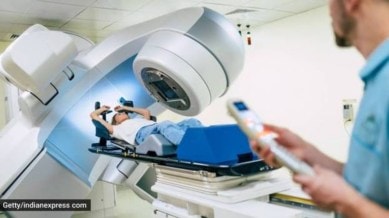Stay updated with the latest - Click here to follow us on Instagram
Get screened to prevent cancer
Dr Sushmita Ghoshal, Professor and Head, the Department of Radiotherapy, PGI, says that detection and treatment can cure approximately one-third of all cancers

In Chandigarh, the lung (11.9%) is the most common primary cancer site among males, followed by the prostate (9.6), and in women, the breast (31.5%) is the most common cancer site, followed by the cervix (6.6) uteri. This data is as per a population-based cancer registry, which is being maintained by the Memorial Centre, Homi Bhabha National Institute, Mumbai, in collaboration with the Post Graduate Institute of Medical Education & Research (PGI).
Prof J S Thakur, Department of Community Medicine and School of Public Health, PGI, says that many cancer patients reach PGI in the third or fourth stage of cancer, and so the outcomes are not very positive. “As part of a national programme of prevention of non-communicable diseases, the directives of the government are to strengthen prevention control measures across hospitals, and we are working closely in this direction with the Chandigarh Administration for screening of three cancers, breast, cervix and oral cancers,” says Prof Thakur. The effort is to check patients for early signs, and symptoms, in the OPDs of hospitals itself.
monthly limit of free stories.
with an Express account.
Dr Suman Singh, Director, Health Services, says that four MOUs have been signed between the Health Department of the Chandigarh Administration and Homi Bhabha Cancer Hospital and Research Centre, New Chandigarh, to provide technical support to the Health Department for improving cancer care services across Chandigarh, and training of public health workers from various departments for cancer prevention and cancer management.
Dr Sushmita Ghoshal, Professor and Head, the Department of Radiotherapy, PGI, says that detection and treatment can cure approximately one-third of all cancers. Cancer, adds the doctor, can be detected early by actively looking for the disease even before it has become obvious – the process is called screening. “Cancers of the mouth or uterine cervix are known to develop over many years through a continuous process of changes in the tissue. These changes are pre-malignant in the beginning and following constant exposure to the risk factor(s) may convert into full-blown cancer. By observing the tissue, it may be possible to detect the changes quite early and appropriate action may be taken to prevent further progression of the disease process. Similarly, small nodules in the breast can be diagnosed by methodical physical examination or seen with the aid of X-rays or ultrasound. When detected in the pre-malignant or early stage, cancer treatment is very effective with lesser side effects and disfigurement.”
According to Dr Ghoshal, approximately 40% of cancers can be prevented by modifying lifestyle and exposure to risk factors.”Cancer of the cervix is associated with a viral infection that can be prevented by vaccination at an early age. When such known risk factors are avoided/ controlled, it can prevent the development of cancer. Therefore, it is important to know the risk factors that lead to cancer.”
Dr Jatin Sarin, senior oncologist, IVY Hospital, said that a few decades ago, breast cancer was seen only after 50 years of age. “Now breast cancer is more common in the younger age group and 50% of all cases are in the 25-50 years age group now. Breast self-examination and mammography can detect breast cancer cases at an early stage. The number of new cases of cancer is expected to rise by about 70 per cent over the next two decades, and awareness is the key, as one-third of cancers can be prevented by lifestyle modification.”